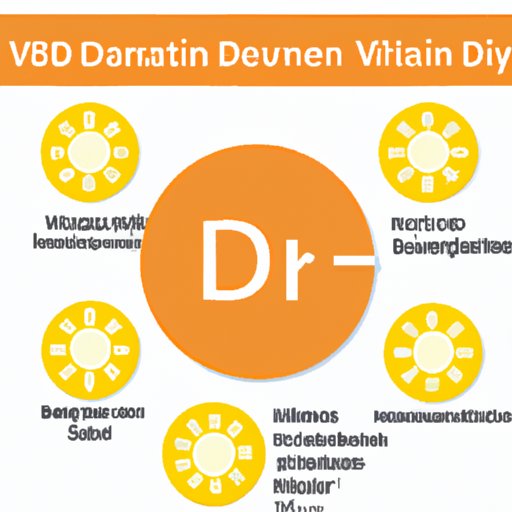
Introduction
Vitamin D is essential for good health, yet many people have a deficiency in this crucial nutrient. In fact, some studies suggest that up to 50% of the population worldwide are deficient in vitamin D. This deficiency has been associated with a range of health problems, from weakened bones to increased risk of chronic disease. In this article, we will explore why taking vitamin D should be a priority in your diet and wellness routine, and the benefits, risks, and solutions associated with it.
The Benefits of Vitamin D: Why You Should Make it a Priority in Your Diet
Vitamin D is a crucial nutrient for overall health and wellness. It helps your body absorb calcium, which is essential for strong bones and teeth. In addition, vitamin D plays a role in reducing inflammation, strengthening the immune system, and regulating cell growth and differentiation. Some studies have also suggested that vitamin D may help reduce the risk of chronic diseases, such as diabetes, heart disease, and certain types of cancer.
Research has also shown that vitamin D deficiency can have serious health consequences. For example, it can lead to osteoporosis, a condition where the bones become brittle and fragile. This can increase the risk of fractures, especially in older adults. In addition, vitamin D deficiency has been associated with an increased risk of depression, fatigue, and compromised immune function, making it imperative to prioritize it in your diet to stay healthy.
The Sunshine Vitamin: How Vitamin D Can Improve Your Overall Health
Vitamin D is often called the “sunshine” vitamin because it is produced in the body when the skin is exposed to sunlight. However, many factors can affect how much vitamin D your body produces, including location, time of day, and skin pigmentation. As a result, it can be difficult to get the required amount of vitamin D through sunlight exposure alone.
Vitamin D deficiency has been associated with various health problems, including increased susceptibility to infections, autoimmune disorders, and even some cancers. Recent studies suggest that there may also be a correlation between vitamin D deficiency and mental health issues such as depression and anxiety, making it crucial to make sure you get enough of this vitamin in your body.
Don’t Overlook the Importance of Vitamin D in Your Wellness Routine
Despite the importance of vitamin D in overall health and wellness, it is often an overlooked nutrient in people’s diets and wellness routines. Many people assume they are getting enough vitamin D through sun exposure or fortified foods, but in reality, they may be deficient. This deficiency can be particularly problematic for those who are older, have darker skin, or live in northern latitudes where sunlight is scarce.
Fortunately, there are several ways to incorporate more vitamin D into your daily routine. One option is to eat more foods that are high in vitamin D, such as fatty fish, egg yolks, and fortified dairy products. You could also consider taking a vitamin D supplement to make sure you reach the daily recommended amount. Alternatively, you can also get out in the sun more regularly, but ensure you’re also taking measures to protect your skin from the harmful effects of the sun.
Vitamin D Deficiency: Understanding the Risks and Solutions
Vitamin D deficiency can occur due to a range of factors, including inadequate sun exposure, a lack of vitamin D in the diet, malabsorption disorders, and certain medications. People who are at higher risk for vitamin D deficiency include those with darker skin, older adults, obese individuals, and people who live in northern latitudes. In addition, some chronic diseases and medications can negatively affect vitamin D metabolism, leading to a higher risk of deficiency.
If you think you may be deficient in vitamin D, it is essential to speak with your healthcare provider. They can test your vitamin D levels and recommend appropriate treatment. This may include supplementation with a vitamin D supplement or incorporating more high-vitamin D foods into your diet.
Maximizing Your Vitamin D Intake: Tips and Tricks for a Healthier You
To maximize your vitamin D intake, there are several steps you can take. Firstly, get more sun; exposing your skin to sunlight during peak hours during the day is the best way to get vitamin D naturally. Furthermore, incorporating vitamin-D rich foods such as eggs, fatty fish and fortified foods into your diet can significantly increase your vitamin D intake. Finally, considering a vitamin D supplement can be an effective way to ensure you get enough of this crucial vitamin.
When it comes to vitamin D supplementation, it is important to approach it carefully. While it’s important to get enough of this vitamin, it is also possible to consume too much. This can lead to toxicity and a range of health problems, such as kidney stones, nausea, and weight loss. So, it is important to discuss vitamin D supplementation with your healthcare provider to determine the right dosage that’s safe for you.
The Surprising Benefits of Vitamin D: Why It’s More Than Just a Bone Booster
Vitamin D offers more benefits than just strong bones. Recent studies have suggested links between vitamin D deficiency and heart disease, autoimmune disorders, inflammation and even an increased risk of cognitive decline. As a result, addressing vitamin D deficiency should be considered as part of a holistic approach to health and wellness. Regular monitoring of your vitamin D levels and ensuring appropriate intake through exposure to sunlight or diet changes is essential for optimal health and well-being.
Conclusion
Vitamin D is crucial for overall health and wellness. Getting enough vitamin D is essential for strong bones, a healthy immune system, and a reduced risk of a range of chronic diseases. However, vitamin D deficiency is common, and many people overlook the need for supplementation through diet and sunlight exposure. By taking a proactive approach to your vitamin D intake, you can improve your overall health and well-being and reduce the risk of serious health problems.





